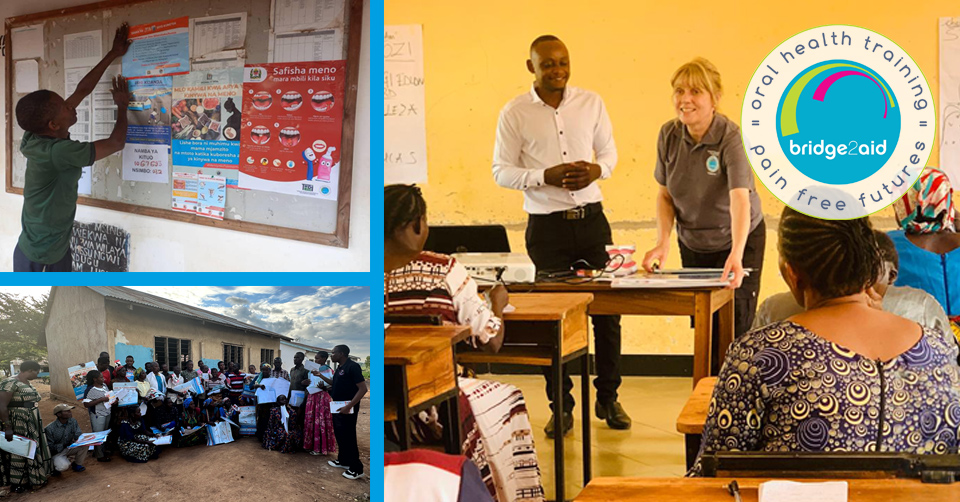In 2024 dental charity, Bridge2Aid, is celebrating 20 years since their first Dental Volunteer Programme in Tanzania. Chief Executive, Shaenna Loughnane, explains how its strategy for delivering aid has changed recently.
One of the key threads of all of our work is around localisation and working hand- in- hand with the Ministry of Health, both in Tanzania and Malawi, as well as local partners on the ground. Those partners are now our strategic partners, and they are the people running the programmes and making all the decisions. Our role now is to to support and help them in ways dictated by them, not us.
Localisation has become a priority; shifting the power from us making decisions in boardrooms in the UK, to being in the hands of the local communities and people. It’s been important to us to get permission from, and ask the Ministry of Health, what they wanted. In January 2024 I travelled to Tanzania and, whilst meeting with the Assistant Director for Oral Health Services (equivalent to the Chief Dental Officer (CDO)), I asked him how we could help.
Saving teeth, not pulling them
He looked me in the eye and said, “So many charities are coming and just pulling teeth out. If someone’s in pain, the only treatment they’re offered is having their teeth pulled out. And while that is a much-needed solution, you don’t do that in your own country. You prevent disease, you carry out restorative work. You’re trying to save teeth, not lose them. So why do you come here and take out teeth?” That was a massive light bulb moment for me and for the rest of the team.
The pandemic in 2020 gave us all some thinking space and one of the decisions we made was to stop sending volunteers abroad because of many negative connotations regarding sustainability. However, the CDO told us he really wanted us to continue to bring volunteers as, with only 600 dentists for a population of 70 million people, there isn’t the workforce to do all the training that is so needed. So, they still need our experience and knowledge, and non-Tanzanian dental professionals to come and support that training.
New programmes
Now, in Tanzania, we’re running three different programmes. One of those is around ending infant oral mutilation, which is vital. We have a local partner (and Bridge2Aid Trustee), Dr. Nila Jackson, who does all of the training and awareness raising within the rural communities. Earlier this year we had some of our team join him to add key oral health care messaging and training as part of his workshops. As it stands, together we’ve trained around about 16,000 people in Tanzania around the dangers of infant oral mutilation and we’ll continue to do that into the next couple of years.
Another programme focuses on preventing disease. We are working with our partners to train teachers and community health workers in some simple prevention messages that they can then cascade into the schools and into communities. If you train one teacher in one school, those messages will then get to 15,000 children which, in turn, will then be passed on to their families. As a small organisation with low resources, we find that kind of cascade model is the most effective. We successfully piloted this programme recently and are hopeful that it’ll roll out into the rest of the country.
The third programme is around supporting and training dental therapists. They’ve opened seven new dental therapy schools recently in Tanzania and they’re encouraging those therapists into the remote and rural areas where there is no dental care. However, each therapist could be responsible for a huge number of people. They’re trained in therapy school and then go straight out on their own with little peer support, so they really need some support in the form of skills training mentoring to increase their confidence and competence – ultimately improving access to quality dental care to underserved populations.
Our plan is to do hands-on skills training with those dental therapists on the ground at the same time as they and our volunteers are treating patients. This will tie-in alongside putting a six-month remote mentoring package in place. So rather than training and walking away, those dental therapists will have access to support in very challenging situations.
Commitment from the top
The CDO is spending a lot of money on getting health clinics and district hospitals equipped with dental chairs, dental x-rays units and upgraded dental equipment. His commitment to this is huge.
The scope of practise of therapists in Tanzania is very different from our dental therapists. In November 2023 that scope was increased to include single rooted endo, as long as they had received recognised training.
He has asked us to put together and pilot a national training programme, so that all Tanzanian dental therapists can offer endodontic treatment on single rooted teeth (and not just the option of extraction!)
Tanzania is really changing, it’s exciting. Oral health is firmly on the agenda. It was discussed in Parliament recently and there’s a big push to increase the oral health of the Tanzanian population. We’re also starting to see that in Malawi through the partnerships we’re involved with there.
It’s great to see some results. All the work we’ve been doing for the last 20 years has been amazing, with the clinical officers we trained being able to get people out of pain. However, seeing that systemic shift in policy at government level is really good, and it is great to be part of that conversation. Obviously, we’re from the UK so we can only be part of that conversation. It needs to be led and directed from Tanzania, but if there’s any way we can support that, and we’re asked to, we will.

